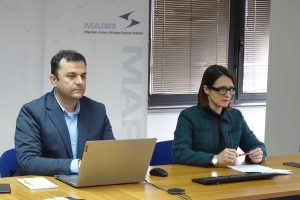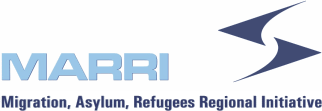 The MARRI Permanent Working Group on Migration Statistics (PWGMS) convened its eighth meeting, bringing together institutional representatives and subject-matter experts committed to enhancing regional cooperation in the field of migration statistics. The meeting was chaired by Angela Boranieva, Director of the MARRI Regional Centre, with the support of the MARRI RC team.
The MARRI Permanent Working Group on Migration Statistics (PWGMS) convened its eighth meeting, bringing together institutional representatives and subject-matter experts committed to enhancing regional cooperation in the field of migration statistics. The meeting was chaired by Angela Boranieva, Director of the MARRI Regional Centre, with the support of the MARRI RC team.
In her opening address, Boranieva welcomed the participants and underscored the growing significance of timely, accurate, and comparable migration statistics for the development of evidence-based policies in the Western Balkans. She emphasized the PWGMS’s role as a key platform for advancing statistical cooperation and promoting data harmonization among MARRI Participants.
Following the adoption of the agenda and the minutes from the previous meeting, the session continued with brief updates and questions from the delegations.
Aleksandar Kostadinov, Migration Data and Policy Analyst at the MARRI Regional Centre, presented the report on PWGMS activities during the reporting period. His presentation covered progress in the collection and exchange of statistics related to international migration and international protection. He introduced a comparative table of indicators submitted by MARRI Participants in the area of international migration and outlined challenges in collecting disaggregated data. The discussion also addressed the level of digitalization in data collection and dissemination, as well as the interoperability of automated data exchange systems among institutions.
Additionally, Kostadinov presented indicators and templates related to Enforcement of Immigration Legislation statistics, which are scheduled for exchange in line with the 2025 timeline. He stressed the importance of a consistent and structured exchange of statistical data, highlighting its value for monitoring migration trends, informing policy interventions, and ensuring alignment with European and international statistical standards.
The meeting also featured an open discussion, allowing each MARRI Participant delegation to share updates on the current state of international migration and international protection statistics within their respective contexts. This exchange of experiences and practices showcased both the progress achieved and the areas requiring further support.
Looking ahead, the meeting reaffirmed the collective commitment to advancing unified mechanisms for the exchange of migration statistics, building on the group’s achievements and lessons learned to date.
